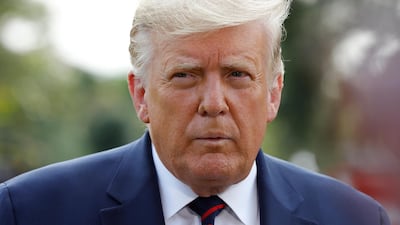Whether they support him or not, political observers have to concede that US President Donald Trump has changed the way his nation does politics. While he is seen as a divisive figure at home, his legacy in the Middle East has been praised by a number of Arab nations and even by Syrian opposition groups and Iraqi activists - particularly after the killing of Iran’s Al Quds Force leader Qassem Suleimani, who oversaw militias that wreaked havoc across the region.
Mr Trump has a personal style that seldom follows political norms. Instead of making repeated grand speeches about peace in the Middle East, the US president resorted to taking action, bringing his allies closer together and demonstrating the US’s resolve to find practicable solutions to long-standing problems.
Mr Trump’s first official trip abroad was to Saudi Arabia, one of America’s closest allies. Since coming into office in January 2017, he has fostered closer relations with other Arab nations in line with American interests. He has also listened closely to their concerns. By pulling the US out of the flawed Iran nuclear deal, Mr Trump highlighted proximity in views with other Arab countries.
Arab leaders had expressed concerns that the deal failed to address Iranian funding to armed proxies that destabilised the entire region. Europe has joined the US and its Gulf allies in taking a tougher stance on Iranian proxies such as Hezbollah, which is now considered a terrorist group in the UK and Germany.
Mr Trump plans to forge a new, better deal, yet Iran has repeatedly refused to accept the need to tackle wider issues. Tehran must resort to diplomacy if it is to reintegrate the international community.
Sectarian warfare, fuelled by Iran-backed proxies and terrorist groups, has plagued the region. The US has led international efforts to destroy ISIS, and its so-called caliphate was quashed during Mr Trump’s tenure. However, the conditions needed to render ISIS a thing of the past have yet to be met. These include peace, economic opportunities, and access to basic rights and services. As a result, sleeper cells continue to terrorise innocents.
The region has been divided by conflict for too long, and its people yearn for peace. In the words of UAE Minister of Foreign Affairs and International Co-operation Sheikh Abdullah bin Zayed: "Our region has suffered far too long. We want to show our people, the region and the world that there is good news."
Mr Trump has undoubtedly played a positive role in changing the dynamics on the ground. Normalisation between the UAE, Bahrain and Israel was made possible in part thanks to US mediation. Mr Trump's unorthodox approach to the Palestinian-Israeli conflict has, however, angered Palestinian leadership and has not furthered their aspirations for statehood. The Palestinian Authority decided to cut ties with the Trump administration after the US moved its embassy to Jerusalem in 2018, recognising the divided city as the capital of Israel.
The PA is also angered by the Abraham Accords. Dr Anwar Gargash, UAE Minister of State for Foreign Affairs, hopes that “once the dust settles” the Palestinians will appreciate that “having a functioning relationship [with Israel] will put us in a better place to support and help them.” He also said that it was up to the Palestinian to lead the way, and that the UAE would continue to support efforts to resolve the conflict with Israel.
Mr Trump will be remembered in the Middle East for his direct yet unorthodox approach, when it comes to achieving peace, and fighting terrorism and extremism. Whatever the outcome of the US presidential election in November, Mr Trump would have left his mark on a region whose affairs are often tied to that of Washington.


